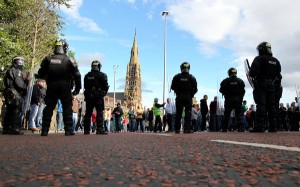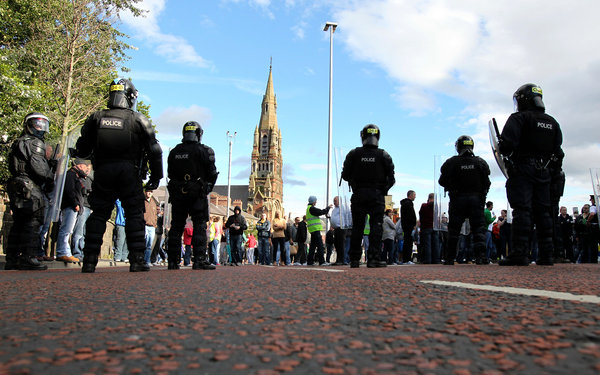
Three nights of sectarian violence followed a republican parade in Belfast on Sunday, leaving over 60 police officers injured.
First Minister Peter Robinson condemned the violence, which began after Protestant loyalists disrupted a Catholic republican parade, according a spokesperson for the Police Federation in Northern Ireland (PFNI).
“We have had about 60 casualties over the past three nights of rioting,” the spokesperson for PFNI said. “When the march turned violent the police were caught in the middle.”
Robinson was quoted by the Belfast Telegraph as saying that he and the Deputy First Minister Martin McGuinness were determined to find a solution to the violence.
During the third evening of violence police attempting to separate the sectarian mob were attacked by rioters on both sides, with fireworks and bricks being flung at them in the Carlisle Circus area in northern Belfast. The violence on Tuesday was not as intense as the previous two nights and the fighting is reportedly now over, according to PFNI’s spokesman. Police had deployed a water cannon and used batons during the riots, but no one was killed and no civilians have been reported injured.
Tensions in Northern Ireland between loyalists and republicans have always run high, but the PFNI spokesman said that in the long-term tensions have eased somewhat. “There has been a decline in the years in terms of inter-communal violence” but republican paramilitary activities have continued. “There is still an armed aggression against the police.”
Parades are one manifestation of long-running sectarian tension between Protestants in Catholics in Northern Island dating back hundreds of years. Due to the sensitive nature of many parades, police are always present and prepared for violence.
Violence has declined from its peak during ‘the troubles’ of the 1960s, when paramilitary armed conflict broke out between Protestant loyalists who wished to remain part of the United Kingdom and Catholic republicans who sought reunification with the Republic of Ireland. The 1998 Belfast Agreement effectively ended most paramilitary activities.
However further violence is feared as a major parade on 29 September will mark 100 years since the signing of the Ulster Covenant. Half a million residents of Ulster signed the document in protest to the proposed Third Home Rule bill intended to give the Irish self-governance.



